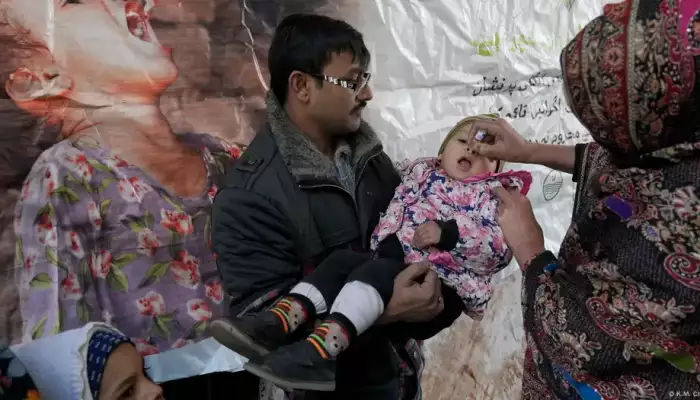
Islamabad: Two shocking incidents of attacks on polio vaccinators recently emerged from Pakistan. Both the incidents are a grim reminder of the country's inability to create a safe environment for the foot soldiers of polio eradication in Pakistan, one of the last countries where polio cases occur when the disease has been wiped out from across the globe.
Pakistan has the dubious distinction of being one of the only two countries in the world where polio is still endemic, the other being its neighbour Afghanistan, according to the World Health Organization (WHO).
In the first case, gunmen in Bajaur region shot dead a polio worker and a policeman when they tried to vaccinate children in their latest campaign against the disease.
The attack occurred on the third day of a campaign to vaccinate 30 million children in a week-long campaign but the incident suspended the initiative in the region, putting the children vulnerable to the disease.
If this incident was scary and put a doubt on the safety of vaccinators in Pakistan who often fight all odds and put their life at risk to keep the future generation safe from the disease, then the other incident left many equally shocked.
In the other incident in Jacobabad a young female vaccinator was allegedly abducted and raped by unknown men.
The woman was allegedly kidnapped by the suspects under the pretext of asking her to vaccinate children.
These two incidents point to the state of affairs in Pakistan where polio is still endemic and eradication poses a major challenge.
Rather than blaming Afghanistan, the neighbouring country which is still registering active polio cases, Pakistan should blame itself for failing to fight the scourge.
In its Editorial, The Express Tribune wrote: "It is not just a security failure, but a societal failure that vaccinators need any protection."
The Pakistani government should immediately take stern measures against those involved in targeting the vaccination teams.
It should also educate the general public about the usefulness of jabbing the children with polio vaccines specifically in those areas where the teams are targeted regularly.
The government should even take strong measures against those spreading false information about the disease in Pakistan.
"Local communities also need to push back against those who spout anti-vaccine rhetoric if they really want to protect their children," the Pakistani newspaper said in its Editorial.
The attack on polio vaccination teams even caught the attention of Indian media which said the assault in Jacobabad highlights how even these female workers, essential to the programme, are at risk.
"Sexual violence against female healthcare workers is rare but represents an especially heinous dimension of the threats they face," the Indian news portal Firstpost said in an editorial published on September 13.
According to the UNICEF website, Pakistan's polio removal initiative did work with a decline in polio cases from approximately 20,000 every year in the early 1990s to only eight cases in 2018.
"As long as the virus continues to circulate in Pakistan, no child in Pakistan is completely safe from contracting the polio virus. This is why it is the shared responsibility of all Pakistanis to ensure that all vulnerable children under the age of five are vaccinated against this deadly disease in every door-to-door campaign," read the UNICEF Pakistan website.
Pakistan launched its vaccination drive as part of its Polio Eradication Programme in 1994 when the South Asian nation used to report more than 20,000 cases annually.
Despite administering more than 300 million doses of the oral vaccine annually and spending billions of dollars, the disease is still rife across Pakistan, according to an Al Jazeera report.
In 2024,, four vaccination campaigns targeting more than 43 million children have already been undertaken as authorities claim they are in the “last mile” of their fight against polio in the country of 235 million people, the report said.
However, disturbing news of attacks on health workers are posing doubts about its immediate complete eradication.
Pakistan should immediately change its stance from taking such attacks lying down in the war against polio to taking stern measures against miscreants.
If the trend of attacking polio vaccinators continues then Pakistan is only harming itself.
Like its neighbour India which has a robust anti-polio campaign leading to its eradication, Pakistan should also adopt a similar programme to eliminate the highly infectious disease.
It should also educate the public and remove all fears acting against the vaccination drive to achieve success.